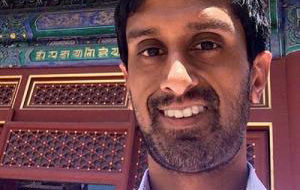Hindu and Muslim children show unexpected religious tolerance
 In a region of India with a long history of tension between Hindus and Muslims, children of different faiths are showing unexpected tolerance for one another’s religious beliefs and customs, according to a new study led by UC Berkeley psychologist Mahesh Srinivasan.
In a region of India with a long history of tension between Hindus and Muslims, children of different faiths are showing unexpected tolerance for one another’s religious beliefs and customs, according to a new study led by UC Berkeley psychologist Mahesh Srinivasan.
Researchers surveyed approximately 100 Hindu and Muslim children aged between 9 and 15 at two different schools in Gujarat, India, the site of violent Hindu-Muslim conflict in 2002.
Their findings, recently published in the journal Child Development, suggest that while most children prefer members of their own religion and their own religious rules, they do not think those rules should apply to members of other faiths. Instead, children indicated that members of other faiths should abide by their respective religious customs.
“Children recognize that the norms of one religion—such as the Hindu prohibition against eating beef or the Muslim custom to fast during Ramadan—don’t apply to members of another religion,” said Srinivasan, the study’s lead author and an assistant professor of psychology at UC Berkeley.

Interestingly, the findings also showed that children distinguish between religious rules and universal moral rules. For example, although children of both faiths believed that their god or gods had the power to allow them to violate religious rules, such as eating beef, they did not think their god or gods could make it okay to physically harm others.
“The study provides some hope that children raised in a region with a history of communal conflict can nevertheless develop tolerant attitudes and respect for other religious practices,” Srinivasan said. “There has been alarming violence in recent years in India stemming from religious differences, such as whether it’s okay to eat beef. Our findings provide hope that such conflicts could subside over time.”
In addition to Srinivasan, co-authors of the study are Audun Dahl at UC Santa Cruz and Elizabeth Kaplan at Syracuse University in New York.
